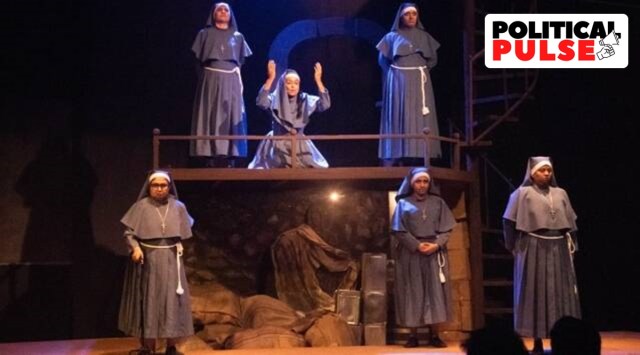Amid ‘The Kerala Story’ row, BJP seizes on a play on nuns, backs Church objections
With Left and Congress calling the film part of Sangh Parivar agenda "to defame Kerala", BJP questions their silence on ‘Kakkukali’ play as sign of Muslim appeasement
 “Kakkukali” revolves around a young nun and the struggles and challenges that she comes across in a convent. (Photo: Facebook)
“Kakkukali” revolves around a young nun and the struggles and challenges that she comes across in a convent. (Photo: Facebook) The simmering controversy over the Malayalam play on nuns, “Kakkukali”, which has now flared up in Kerala in the wake of the row over the film “The Kerala Story”, seems to have given a fresh opportunity to the BJP to find a common cause with the Christian Church in its bid to make an outreach to the minority community.
“Kakkukali” revolves around a young nun and the struggles and challenges that she comes across in a convent. It is a theatre adaptation of a Malayalam short story with the same title written by Francis Norona. Scripted by K B Ajayakumar, it is performed by the Alappuzha-based Neythal Nataka Sangham under the direction of Job Madathil.
In early March, the influential Kerala Catholic Bishops Council (KCBC) first raised the demand for a ban on “Kakkukali” for its “anti-Christian content”, charging that it “insults the self-respect of nuns”. The KCBC’s demand however did not have any political resonance then, even as the staging of the drama continued to take place in different parts of the state.
Last week, when the trailer of the multilingual film “The Kerala Story”, which tells the story of a group of women who had converted to Islam before being recruited to the ISIS, was released, it sparked strident protests by the Muslim organisations as well as the ruling CPI(M)-led LDF and the Opposition Congress-led UDF.
Directed by Sudipto Sen and produced by Vipul Amrutlal Shah, the film claims that 32,000 women in Kerala allegedly converted to Islam and were recruited by the terror organisation. Amid the blowback, the filmmakers later altered the figure of such recruited women to just 3 in the revised trailer.
Both the Left and the Congress blamed “The Kerala Story” as being allegedly part of the Sangh Parivar agenda to defame Kerala and sought a ban on its screening. Kerala Chief Minister Pinarayi Vijayan charged that at first glance the film appeared to allegedly peddle lies aimed at creating communal polarisation and spreading hate propaganda against the state.
Barely a day after these protests, on April 28, the KCBC raked up its demand for a ban on “Kakkukali”. Upping the ante, the Social Harmony and Vigilance Commission under the KCBC blamed the CPI(M) and the Congress for their “silence” over this demand. Questioning the approach of the state’s leading parties, the KCBC said in a statement: “The release of a trailer on Kerala Story has shocked the political and cultural circles in Kerala. Producers have made clear that the love trap and its links with terror recruits are being discussed in the film. People of Kerala would not have any lack of clarity on whether such things happen in the state. Even then, the movie is being objected strongly and political leaders say that it would not come within the purview of freedom of expression.”
The KCBC has often expressed concerns against growing Islamic radicalisation and “love jihad” in Kerala. The BJP has rallied round the Christian body on these hot-button issues. The saffron party has been making attempts to expand its footprint in the state by reaching out to the Christian community.
As the CPI(M) and the Congress went ahead with attacking “The Kerala Story”, the BJP sought to turn the focus on the “Kakkukali” row, coming out in support of the Church’s stance that the play has “insulted” the Christian clergy. The saffron party also seized on the issue to go after the CPI(M) dispensation over its alleged appeasement of the Muslim community.
On April 28 itself, the BJP’s state unit president K Surendran, in a statement, said: “People of Kerala can understand the CPI(M) leaders’ selective secularism and selective freedom of expression. The Chief Minister should understand that this double standard for vote bank politics is more dangerous than religious fundamentalism. When Kakkukali insulted the Christian faithful, you considered it as freedom of expression. People of Kerala do not expect an impartial approach from the Government, which has become a slave of extremism.”
Some Christian bodies also stepped in on social media to highlight the “silence” of the CPI(M) and the Congress over the “Kakkukali” affair as compared to their demand for banning “The Kerala Story”. On April 29, the Catholic Church took out a march at Vatakara, a CPI(M) stronghold, in protest against staging the drama. This was the first open agitation on the part of the Church at a venue of the play.
On Tuesday, KCBC president Cardinal Clemis told media persons: “We want the government and the political parties to reveal their stand on the drama, which is insulting the nunhood and the service of nuns.”
The Malankara Orthodox Syrian Church on Wednesday joined the Catholic Church to demand that “Kakkukali” be banned. Its spokesperson Mohan Joseph said the “self-restraint” of Christians should not be seen as a weakness of the community. The drama is an “insult” to the selfless service of nuns in Kerala, he charged, adding that it should not be allowed to be staged in Kerala.
The BJP’s state general secretary George Kurian also asked the LDF ally Kerala Congress (M), a regional Christian party, whether they endorsed the bishops’ demand for banning the play, alleging that the party has “betrayed” the community they represent.
Amid growing Christian protests over the drama, the Congress’s state president K Sudhakaran, in his Facebook post on Tuesday, said, “We are concerned that Christian clergy is insulted. The freedom of expression should not be meant to bring people to blows. Those behind the drama should have realized that the Sangh Parivar and CPI(M) would exploit the situation for their political ends.”
The Leader of the Opposition (LoP), V D Satheesan, also said the Vijayan government should examine whether “Kakkukali” insulted religious sentiments.
Taking into account the BJP’s bid to capitalise on the row, Cultural Affairs Minister and CPI(M) leader Saji Cheriyan said: “We got a complaint from bishops. As the drama is not related to the government, we cannot ban it. But a direction has been given to its organisers to make necessary corrections.”



- 01
- 02
- 03
- 04
- 05




























